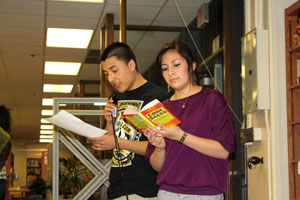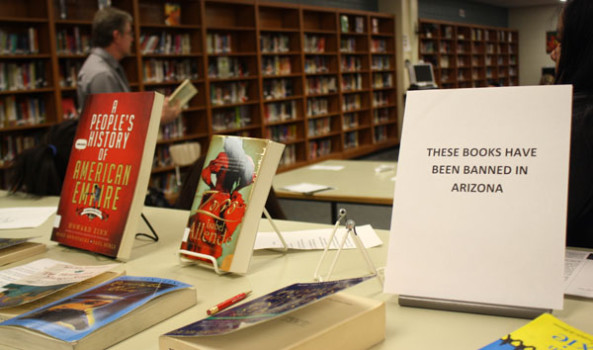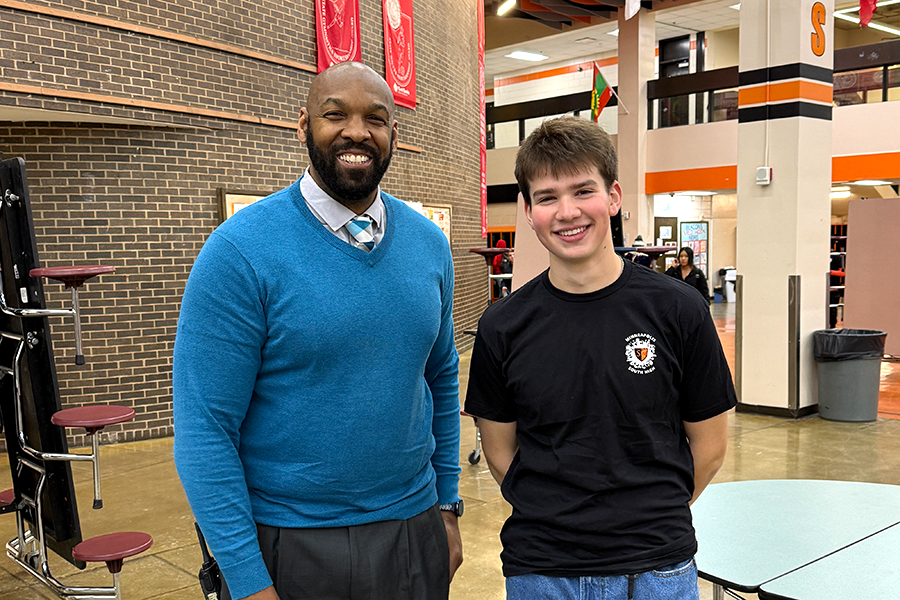
Yesterday, Unidos hosted an all day read-in, where they read from books banned in Arizona in the media center. Student and teacher volunteers read aloud in short shifts in both English and Spanish.
“I just want people to know what’s going on and to be aware,” said junior Vilma Quito. The protests were meant mainly to gain attention for this important issue, and to show support for Arizona. In order to do this, Unidos students are also compiling a video to send to students in Tucson, to show that South stands behind them.
In mid-February, classrooms at South were invaded by people dressed all in black, taking books that students were reading out of their hands, and covering up posters that they deemed inappropriate. When the confused students wondered what was going on, the answer they got was simple: ethnic studies had been banned, and anything promoting ethnicity had got to go.
Thankfully, here at South the officials dressed in black were really only students from the Human Rights Group and the Hispanic student group Unidos. But what they were pantomiming is something very real happening in the state of Arizona.
Last year, a bill was passed in Arizona that would ban ethnic studies. House Bill 2281 was put into effect at the beginning of last month. It is a law that bans programs that are catered to students of a certain ethnicity, such as the All Nations program at South.
Though the law issues a blanket ban on all ethnic studies, it is specifically aimed at Mexican American studies. Ironically, it was a Mexican immigrant, Estevan Ochua, who founded the first public school in Tucson (Huffington Post). Native American studies are not affected, but only because they are protected by law.
Senior Elena Anderson, president of Human Rights Group, says: “There’s a lot of people who are very against the amount of immigration that’s happening in Arizona…and that’s why a lot of the programs being targeted are Hispanic studies.”
To Rob Panning-Miller, social studies teacher at South, it was obvious from the beginning that South would have to respond to Arizona’s cry for support.
“It was just shocking. It’s just amazing that people are this close-minded in this day.” said Panning-Miller.
“This is essential. In order to get other actions carried out, in order to really improve the situation for people, and human rights for people, you have to make sure they have access to information, and depriving them of information is violating essential human rights.”
Part of the bill was a long list of books that have been banned from the curriculum. The official story with these books is that they “have been moved to the district storage facility”, according to the Tucson Unified School District. While the government insists that students still have access to the material, the fact remains that it has been taken out of the curriculum, and it is being actively discouraged.
Because the teachers of Tucson cannot teach these books any longer, they appealed to teachers around the country to take time during the month of February to teach what they can’t, and to use these books in their own curriculum.
When Panning-Miller heard about this, he immediately brought it up to Human Rights Group and Unidos, both of which responded with enthusiasm.
“I’m actually really proud to participate in this, because it make me feel like I’m actually doing something, and I’m actually standing up for something, especially if it affects my culture,” said Quito, a member of Unidos and participant in the protests. “I’m not Mexican, and even though it pointed out Mexican American studies, it still affects me, because I’m still not American.”
Part of the protests were set up to mimic what government officials did in Arizona, going into classrooms and blatantly taking down anything that could be associated with ethnic studies.
“We want [students] to be confused,” said senior Jonothan Moreno, president of Unidos. “That that will hopefully get the idea into their heads.”
When leaving the Laura Wagner’s 5th hour APUSH class, Moreno said: “Do you know why this is happening? Because learning ethnic studies is going to make you want to overthrow the government. Obviously.”
Though this may sound merely satirical or even funny coming from the mouth of a high schooler, House Bill 2281 does express the fear that classes that focus on a particular culture or ethnicity promote the overthrowing of the US government. The proponents of the bill have also said that these classes engage in hate speech, sedition, racism, and instill revolutionary values in their students.
According to Panning-Miller, the important thing “is to make it very clear that this can’t happen here.”
-See an extended article about the movement at South to protest the Arizona ban on ethnic studies in the print edition coming out in March-







